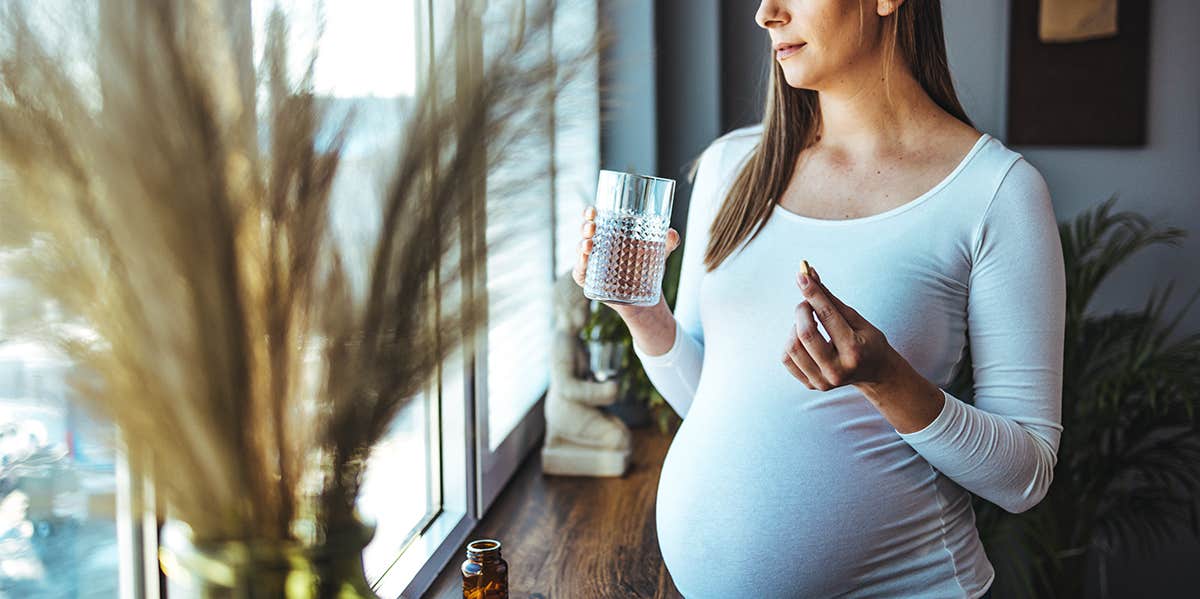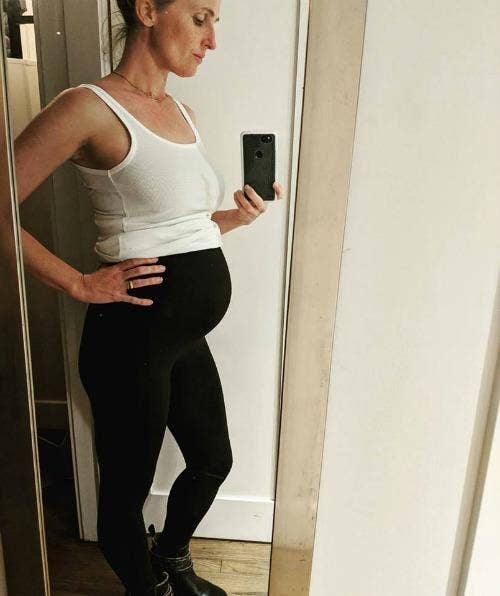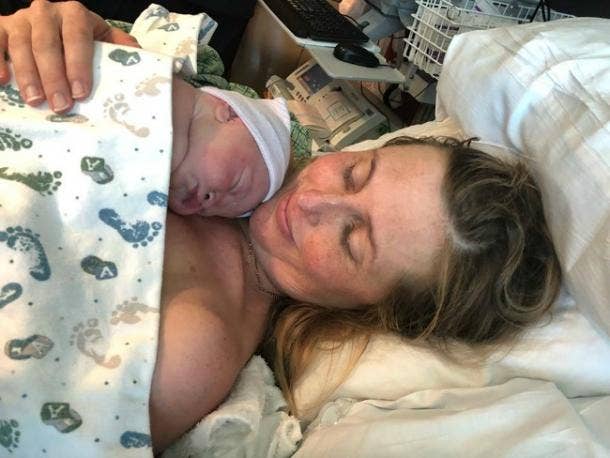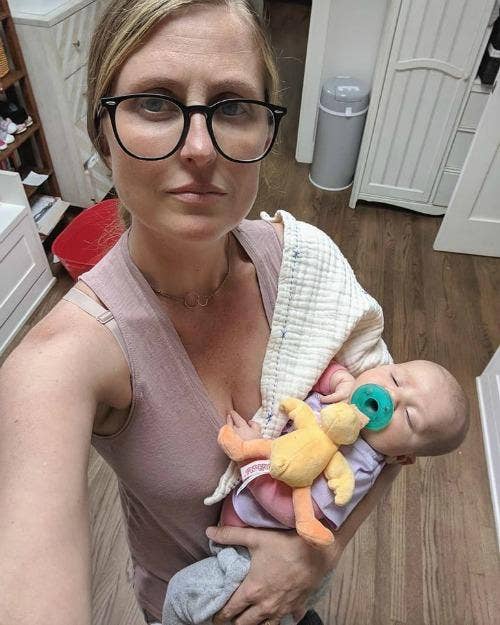
Depression during pregnancy is serious, so let's start talking about it.
By Joanna Schroeder — Written on Sep 19, 2022
Photo: Dragana Gordic / Shutterstock

Society lies to women about pregnancy.
Sure, we expect to gain a little weight and feel queasy at first, but most of us are not prepared for reality. No matter how close you were with your sister or your BFF when she was pregnant, you can’t know what it’s like to surrender your body and identity to a whole new human being.
And one thing nobody prepares you for is dealing with depression during pregnancy.
What surprised me most, despite the fact that I’d been pregnant before, was the depth of despair that came with the episodes of depression I experienced during pregnancy.
As a person who has dealt with Major Depressive Disorder for more than twenty years, I should have known that I was vulnerable to depression during pregnancy, as well as postpartum depression. But I guess I was sort of in denial.
My pregnancy was supposed to be sacred. I was supposed to be glowing and beautiful and capable of handling it all.
I have no idea why I believed that. I’m none of those things, even when I’m not pregnant! I'm clumsy and complicated and sometimes go a week without washing my hair.
But it’s part of the dangerous mythology that surrounds having a baby and being a good mom, fed by the toxic mom-shaming culture that exacerbates already powerful mom guilt.
Fundamentally, I felt I was supposed to be happy. After all, I’m in a healthy, long-term relationship and we had enough money and family nearby. What was there to be depressed about?
I always know when I’m falling into depression, pregnant or not, because I feel sad, scared, and angry for no reason. Depression during pregnancy felt exactly the same — but worse.
It was worse because I felt like a failure to the kicking, wiggling little life inside me. On top of that, I felt like I couldn’t ask for medication, which has helped me find relief when I've needed it for half my life.
When I’m pregnant, I don’t even want to take a Tylenol, let alone something like an antidepressant with a long list of potential side effects.
Apparently, I’m not alone.

I asked Dr. Sherry A. Ross, women’s health expert and author of She-ology: The Definitive Guide to Women’s Intimate Health. Period., what keeps women from seeking help for depression during pregnancy.
She explained that the side effects of antidepressants during pregnancy can be serious.
RELATED: How Postpartum Depression Almost Killed Me
“Many antidepressants are known to cause an increase in miscarriage and birth defects early in pregnancy, and fetal malformations, heart defects, and reduced birth weight later in pregnancy,” says Ross.
As noted by the Mayo Clinic, some medications are considered safer than others:
- SSRIs: "Most studies show that SSRIs aren't associated with birth defects. However, paroxetine (Paxil) appears to be associated with a small increased risk of a fetal heart defect."
- SNRIs: "SNRIs also are considered an option during pregnancy, including duloxetine (Cymbalta) and venlafaxine (Effexor XR). However, research suggests that taking SNRIs at the end of pregnancy is associated with postpartum hemorrhage."
- Bupropion (Wellbutrin): "Although bupropion isn't generally considered a first line treatment for depression during pregnancy, it might be an option for women who haven't responded to other medications. Research suggests taking bupropion during pregnancy might be associated with heart defects."
- Tricyclic antidepressants: "Although tricyclic antidepressants aren't generally considered a first line or second line treatment, they might be an option for women who haven't responded to other medications. The tricyclic antidepressant clomipramine might be associated with fetal birth defects, including heart defects. Use of these medications during the second or third trimester might also be linked with postpartum hemorrhage."
- Monoamine oxidase inhibitors (MAOIs): MAOIs "are generally discouraged during pregnancy. MAOIs might limit fetal growth."
Additionally, they say, "The connection between antidepressant use during pregnancy and the risk of autism in offspring remains inconclusive, but most studies have shown that the risk is very small, and other studies have shown no risk at all. Further research is needed."
That’s terrifying. What good mother would subject her unborn baby to those risks?
Turns out, I would.
Having survived pregnancies before without antidepressants, I thought I could do it again, but depression struck hard me in my third trimester. It was strange because I felt good, physically, and the baby was healthy.
But darkness still crept in. Actually, it leaped in all at once and I was a mess. I was crying over nothing, fighting with my husband, and feeling totally unsuited for motherhood. Life felt hopeless. I started to wonder if I could survive my pregnancy.
I wasn’t suicidal, per se, but I did wonder if my children would be better off without me. Not dead, but maybe just gone.
The thoughts scared me and I tried to push them away, but eventually, they became intolerable, and I confessed it all to my doctor.
Fortunately, being in my third trimester made taking my meds a little less scary, as some doctors believe it may be safer then.
As Dr. Ross explains, “It's always best to avoid taking antidepressants or any potentially harmful medication during the first trimester where the embryo can be the most vulnerable and at risk.”
I was warned of potential side effects, including the baby’s lower lip and jaw quivering, sort of like a shiver, soon after birth.
As explained by Dr. Lauren Osbourne of Johns Hopkins University, "About 30 percent of babies whose mothers take SSRIs will experience neonatal adaptation syndrome, which can cause increased jitteriness, irritability, and respiratory distress (difficulty breathing), among other symptoms. Doctors aren’t sure whether this effect is due to the baby’s withdrawal from the SSRI after birth or exposure to the drug itself before birth."
“'It may be distressing and cause pediatricians to run tests, but it will go away,' says Osborne, pointing out that these symptoms also sometimes occur in babies whose mothers don’t take SSRIs."
There's also a potential delay in crying.
As reported in U.S. News, a study led by Dr. Alan Brown, professor of psychiatry and epidemiology at Columbia University Medical Center, found that infants born to mothers on antidepressants "do have more breathing problems and the likelihood of being in the ICU... [withdrawal] from antidepressant drugs, or 'neonatal abstinence,' is likely behind the short-term respiratory problems these babies have at birth..."
"While there's potential for later problems, he says, so far there haven't been long-term research to show that."
That sounded scary, but I was reassured that they had been using this medication in cases like mine for many years and believed those particular side effects to be relatively minor.
RELATED: I Knew The Risks — But I Took Drugs During My Pregnancies Anyway
But was taking any risk at all too much risk? Was I selfish for wanting to be free of this awful feeling?

Dr. Ross explains that “[For] women with severe depression, anxiety or psychiatric conditions, the benefits of being on medication may outweigh the risks to the pregnancy or baby.”
The downside of avoiding meds isn’t just about suicide, although, if you are feeling suicidal while pregnant, definitely talk to your healthcare provider as soon as possible.
There are a whole host of other potential complications faced by mothers who choose to abstain from prescription medications for mood disorders during pregnancy.
“Women who go off their normal medications or are untreated during pregnancy are at an increased risk of having a relapse of symptoms, which could potentially be harmful to baby and mother,” says Ross. “Depressed women are more likely to have poor prenatal care and pregnancy complications, such as nausea, vomiting, and preeclampsia, and to use drugs, alcohol, and nicotine.”
Yikes.
Another argument in favor of taking antidepressants during my pregnancy was knowing I could potentially get ahead of possible postpartum depression (PPD).
I knew that once I was home with my baby, it would be harder for me to get back to see the doctor for treatment. Add sleeplessness, recovering from the trauma of birth, sore nipples, and the needs of older kids into the mix, and it’s easy to see why so many moms sink into PPD without realizing they need help.
"Unless the healthcare provider is proactive and starts early treatment for high-risk women for this serious postpartum complication at 36 weeks, it can be hard to properly diagnose and stay ahead of the debilitating symptoms associated with PPD,” explains Dr. Ross.
I knew I needed meds, and learning the facts confirmed it. So why did I feel so awful? Why did I feel like a failure for doing what I believed was best for both me and my baby?
According to Robyn Stein DeLuca, Ph.D., a psychologist, and postpartum consultant, the pressure and guilt are connected to a fundamental misunderstanding of the role of women in society, tying into the expectations placed upon women to be perfect, especially once we become moms.
In addition, pregnant people and parents-to-be face a lot of pressure to do everything "right" — as if there is one right thing to do in every circumstance.
Mom-shaming abounds both in real life and in online communities like Facebook's high-intensity "due date groups". It seems like no matter what you do, nothing is good enough.
One particularly poignant article on The Bump explains what mom-shaming is perfectly: "Sometimes it’s those subtle jabs, sideways glances or the seemingly innocent commentary from other moms in the drop-off line that can cause a woman to question her motherhood journey."
Of course, we all want to do what is safest for our kids. We practice safe sleep and use properly-installed car seats. We check with the doctor before taking meds and we completely avoid alcohol, nicotine, and illegal drugs.
But when it comes to parenting choices that aren't so clear-cut, like treating serious depression with medication during pregnancy, there may not be one "best" answer that will satisfy all the mom judgers and shamers out there.
How can anyone live up to the myth of the perfect mother? How can reality ever meet the expectations set by the celebrity moms we see cradling newborns with their hair styled, makeup in place, and their bodies in perfect pre-baby shape?
Why can’t we just be honest? Pregnancy, childbirth, and parenthood are messy and imperfect!
There is a prevalent myth that "good" moms have perfect, joyful pregnancies. No matter how often women talk about how uncomfortable pregnancy can be, somehow we feel like failures if we aren’t happy every single second we are "with child."
It’s like we aren’t grateful for our babies if pregnancy feels hard, or even impossible, sometimes.
“The myth of the perfect pregnancy comes from the idea that women are more biologically based than men and that pregnancy is the most natural thing they can do,” explains Dr. DeLuca. “Many women don't like being pregnant or get difficult symptoms like nausea, hip pain, swelling, and exhaustion. This myth hurts women's self-esteem. If they can't be blissfully happy during pregnancy, then they think they aren't a good woman.”
Related Stories From YourTango:
This rings so true for me.
RELATED: The Terrifying Reality Of Going Off Depression Meds To Have A Baby
I didn’t have many friends who had babies before me, so I didn’t know if my complicated feelings were normal. Even with my second and third pregnancies, there were surprises — like my depression — that I was afraid to discuss with my friends.
According to Dr. DeLuca, that loneliness isn’t unusual:
“We don't live in extended families anymore. A hundred years ago, a woman would have witnessed her aunts and sisters and probably her mother's pregnancies and would have a very good idea about what it would be like and how to care for a newborn. Women don't have those automatic support systems anymore.”
Every time I’ve had a baby, my body has felt foreign, permanently changed. Every time, I’ve mourned the life that came before, despite being grateful for my babies.

All photos: Author
Even Dr. DeLuca experienced something similar:
“I remember being so traumatized by the emergency C-section I had that I had a hard time bonding with my daughter and I was depressed for several weeks. I felt so ashamed and didn't want to tell anyone. If someone had told me that they had felt something similar, it would have gone a long way in alleviating my guilt and I wouldn't have waited so long to get help.”
That’s why we have to talk more about how the perfect pregnancy doesn’t exist, and how dangerous the myth of the perfect mother is.
We need to talk about what it feels like to deal with depression during pregnancy, and all of the unique challenges that go along with that.
Looking back, I’m so glad I decided to push through the fear.
Of course, this decision will be different for everyone, and there are a lot of factors to consider, but for me, it was a game-changer. My baby was born healthy, other than a scary moment waiting to hear that first cry, and I’m super grateful for that.
I’m also grateful that I treated my depression with antidepressants, even though I was scared of the potential side effects.
The meds made it possible for me to appreciate the rest of my pregnancy and enjoy my baby. What could be more important than that?
RELATED: 5 Truths About The Crushing Darkness Of Postpartum Depression
More for You:
Joanna Schroeder is a feminist writer and media critic whose writing has appeared in The New York Times, Time, Redbook, Cosmopolitan, BuzzFeed, Babble, Everyday Feminism, Vox, and more.
